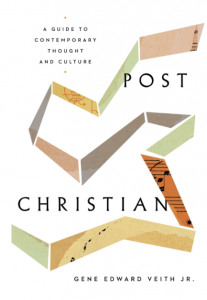
Author: Veith, Gene Edward Jr.
Genre: Theology - Postmodern
Tags: Christian Living / Cross / Discipleship, Modernism / Postmodernism
Series:
Rick Shrader‘s Review:
I have read Gene Edward Veith, Jr. since I first learned of postmodernism from his book Postmodern Times in 1994. Veith considers this book to be a follow-up of the previous work. He has also written numerous other books on related subjects. This is a 2020 book and is a great update on the current American situation. Are we “post-Christian?” Vieth says yes and no. We are in the sense that postmodernism has morphed into a time that has taken our country and culture beyond what Christianity has normally been. He writes, “Postmodern Times discussed the sexual revolution in terms of extramarital sex; now the issues are homosexuality, pornography, and sex robots. In the 1990s we were deconstructing literature; in the twenty-first century we are deconstructing marriage. In the 1990s we were constructing ideas; in the twenty-first century we are constructing the human body. In the 1990s we had feminism; in the twenty-first century we have transgenderism; in the twenty-first century we are warned about committing cultural appropriation. Pluralism has given way to identity politics. Relativism has given way to speech codes. Humanism has given way to transhumanism, the union of human beings and machines” (p. 17).
But Veith also contends that, no, we are not entirely “post-Christian.” In various ways Americans (and other worldlings) are retaining older and ancient forms of religions even if they are not Christian. He writes, “So scholars no longer accept the ‘secular hypothesis,’ the assumption that as a society becomes more modern, it becomes less religious. The global religion explosion–which is happening not only among Christians but also among Muslims, Buddhists, and Hindus–proves that. . . This has given rise to a new term that is gaining currency among scholars in multiple fields. It is another post– word. Not postmodern. Not post-Christian. But postsecular. What is emerging or is already upon us is a postsecular culture” (p. 289). In other words, the “nones” and millennials are adopting various forms of pagan cultures and using them in their selfish life-styles–everything from self-help spiritualities to back-to-earth food and medicine to yoga. But, Veith reminds the reader, “Christianity has a high success rate evangelizing the heathen.” But also, “If postsecular non-Christians are ‘spiritual but not religious,’ the church would do well to recover its own heritage of Christian spirituality” (p. 299).
This is a great update to Postmodern Times, and well worth the money and time to read.
